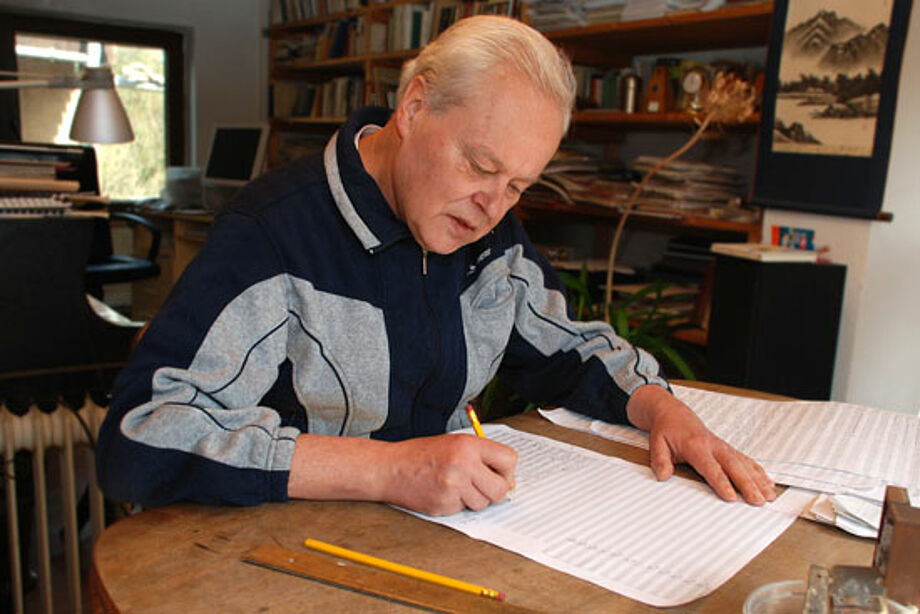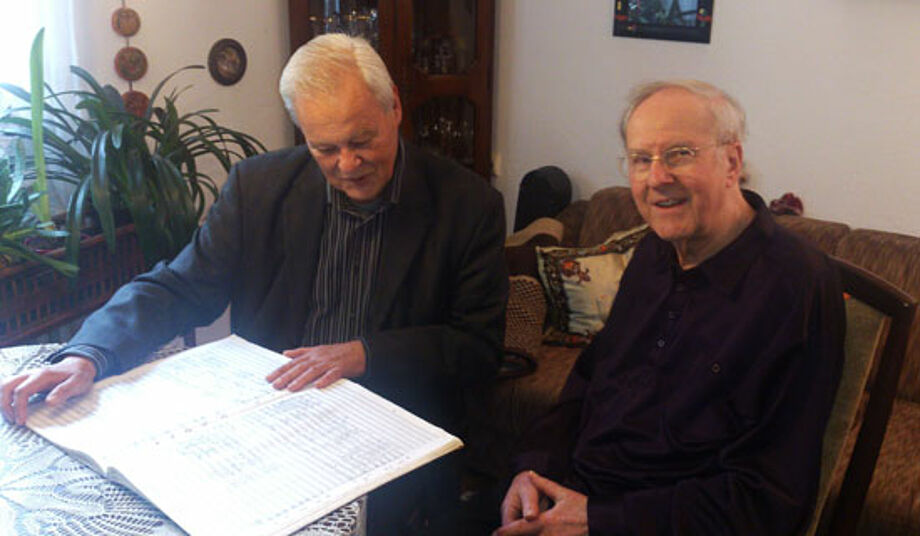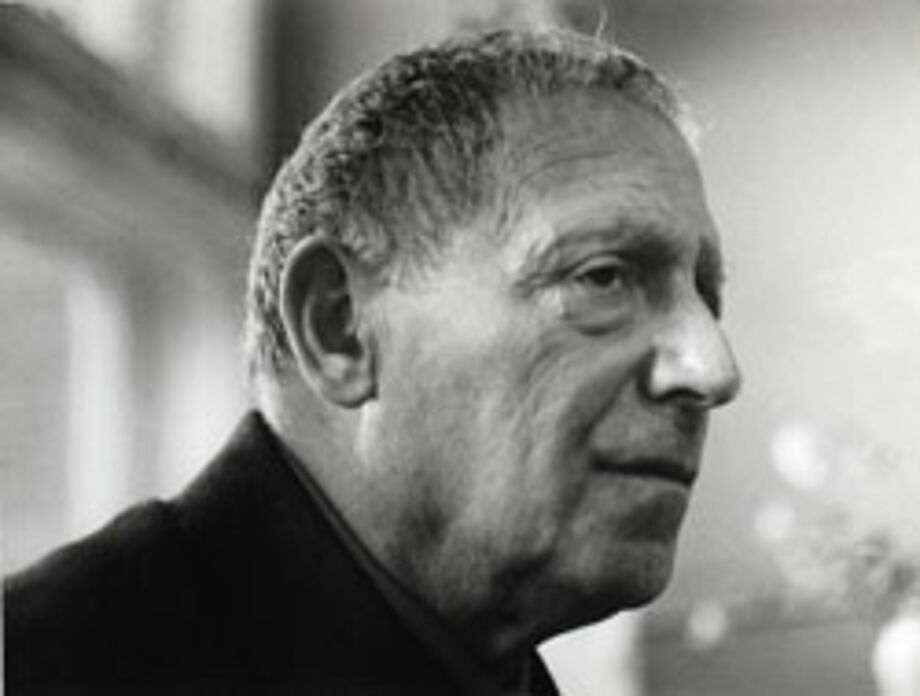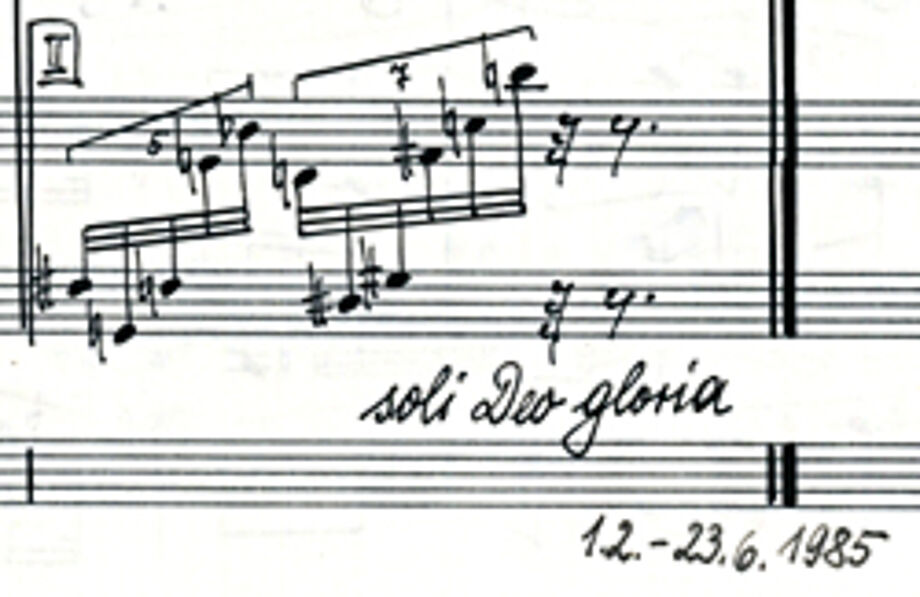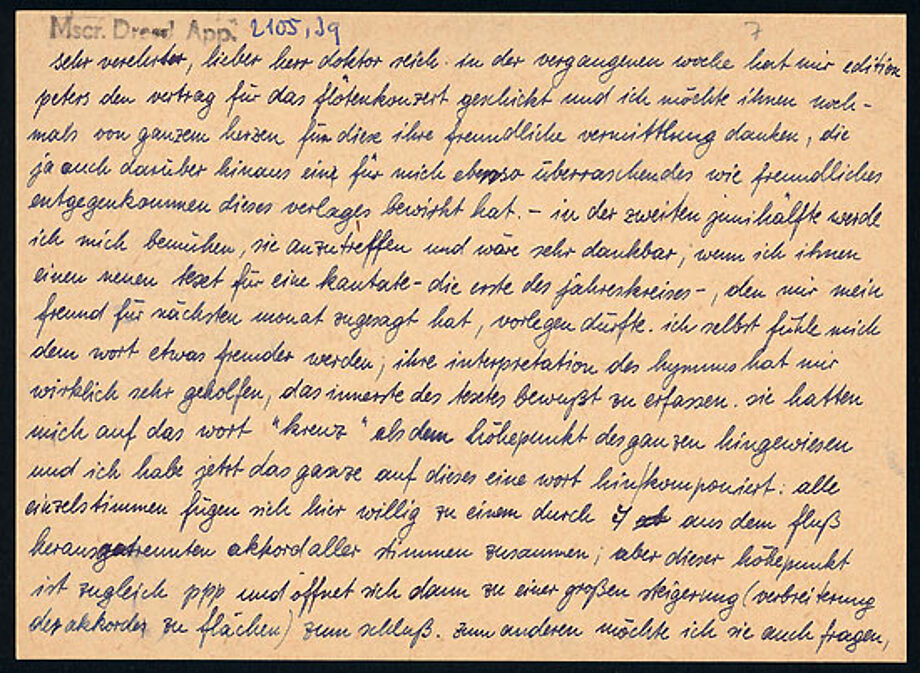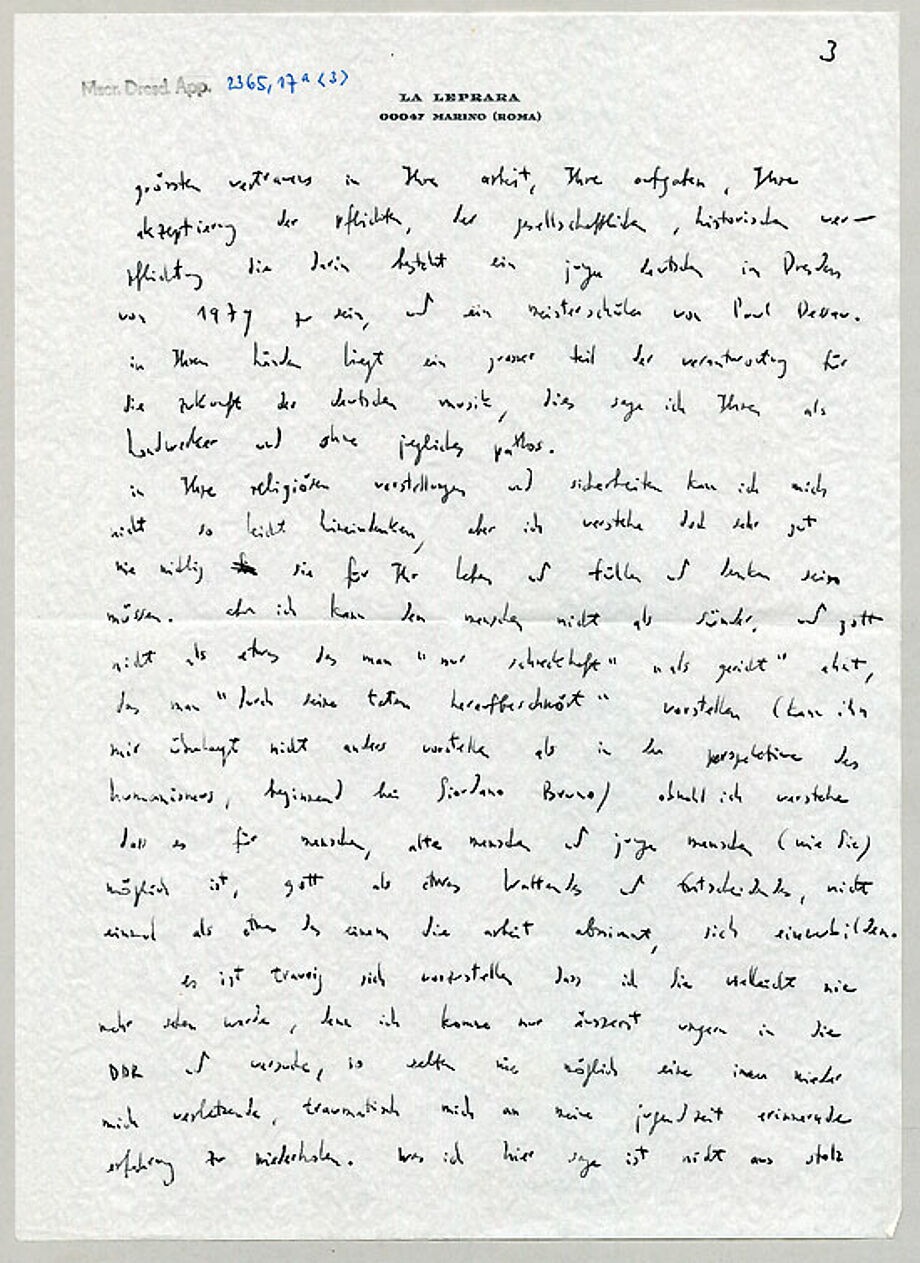Jörg Herchet
A special relationship with the music department of the SLUB
During his time as a student, Jörg Herchet made intensive use of the library's stock. Here he got literature that could not be bought in the bookshops of the GDR. In Dr Wolfgang Reich, the head of the music department from 1960 to 1992, he found an appropriate discussion partner on the topics that moved him, such as composition, philosophy and theology. Cards and letters from Herchet to Reich, which are kept in the manuscript collection, are contemporary witnesses to this. Almost all of Jörg Her chet's composition autographs are archived in the SLUB's composer archive. Wolfgang Reich purchased numerous works by Herchet for the music department. On the one hand, it was to build up the composers' archive, but also to promote young composers who had no real opportunities in the GDR due to their biographies. Through the mediation of Wolfgang Reich, some of Herchet's works were performed in West Germany after 1980. After 1980, he spent study periods at the composers' seminar in Boswil (Switzerland). This was his entry into the European music scene. Numerous world premieres followed at home and abroad. A catalogue of his works is included in Christoph Sramek's publication "Die Töne haben mich geblendet" - a commemorative volume on the occasion of Jörg Herchet's 60th birthday.
To the biography of Jörg Herchet
Manfred Weiss and Paul Dessau - his revered teachers
Jörg Herchet studied composition with Manfred Weiss and was a master student of Paul Dessau. "Paul Dessau's] ability to grasp new scores was just as extraordinary as his ability to find the right pedagogical word. even at the first read-through, he noticed small spelling mistakes as well as deficiencies in content, i.e. in form. but he could also praise. unforgettably, he suddenly read a composition more slowly and asked appreciatively: 'how long did you work on this passage?it actually took me more than three weeks to write these 10 bars. after my last lesson as a master student, he said goodbye to me: 'and now you come as a friend of the house'. the unity of man and musician had already touched me deeply during my first visits, and had even had a decisive influence on me."
jörg herchet
Jörg Herchet and Paul Klee
 In 1964, Jörg Herchet first came into contact with the painting of Paul Klee, which officially received no interest in the GDR. The standard for the visual arts in the GDR was exclusively Socialist Realism. Herchet studied Paul Klee's paintings and theoretical writings at the Saxon State Library, now the SLUB. Thus the artist became an indirect teacher for Herchet in his compositional studies. "Dreitacte im Geviert". "Der Dreitact" dissolves the chessboard rake and transforms the design into a musical event. Was Klee thinking of Bach, whom he played early in the morning when he wanted to get in shape.Photo: Archiv Lang
In 1964, Jörg Herchet first came into contact with the painting of Paul Klee, which officially received no interest in the GDR. The standard for the visual arts in the GDR was exclusively Socialist Realism. Herchet studied Paul Klee's paintings and theoretical writings at the Saxon State Library, now the SLUB. Thus the artist became an indirect teacher for Herchet in his compositional studies. "Dreitacte im Geviert". "Der Dreitact" dissolves the chessboard rake and transforms the design into a musical event. Was Klee thinking of Bach, whom he played early in the morning when he wanted to get in shape.Photo: Archiv Lang
Kompositionsanliegen
"also ich wünschte, daß in aller meiner arbeit das ‚soli Deo gloria‘ empfunden wird. ich unterscheide nicht zwischen geistlichen und weltlichen werken. ich würde die aufgabe des künstlers, also meine persönliche aufgabe darin sehen, daß man das sinnliche durchsichtig macht für das ewige. wenn ich „religiös“ sage, dann denken wahrscheinlich viele menschen: aha, das ist also das, was man heute unter fromm versteht. sie wären entsetzt, wenn sie merken, was ich darunter verstehe. sie sind`s ja auch oft, wenn sie musik hören."
"also für mich ist ‚religio‘ vor allem ehrfurcht. da ich aber mein ganzes leben nur begreifen kann als einen weg zu Gott hin – wo ich da stehe, und sicher stehe ich noch sehr fern, das wäre eine andere frage. aber vielleicht ist auch das wichtigste dieses bemühen, zu Gott zu gehen und ihm näher zu kommen. ein bemühen, das von uns aus, von mir aus ohnedies keinen erfolg hat, das nur dann verwirklicht wird, wenn Gott uns entgegenkommt. ich würde meine musik als eine sehnsucht nach Gott empfinden."
"die größten werke entstehen, wo in der strengsten ordnung sich fruchtbarste und erhabenste freiheit auftut. Bach unterwarf sich der ordnung des kontrapunkts sowohl als der harmonik und gehorchte ihrem doppelt strengen gesetz: und schuf das freieste werk. (...) nach Bach ist es erst wieder Arnold Schönberg, der die probleme des kompositionsunterrichts für sich und seine schüler löst."
jörg herchet
Christoph Sramek on Jörg Herchet
"Even his earliest works were not suitable for socialist realism. Jörg Herchet has always been a challenge, and not only aesthetically. Even after the fall of communism, he did not become a model composer, even though his compositions are widely acclaimed today. Many things seem all too frightening at first hearing: Percussion batteries and sirens in a Marian cantata, the contrast between Gregorian chant and techno music in an organ piece. The break between church and world weighs heavily on the Dresden composer, who puts the "Soli Deo Gloria" under his works without any attitude at all." "Since his first organ lessons in Dresden-Plauen, his work as a registrar with Herbert Collum and especially since his direct encounters with the great organ of the Kreuzkirche in Dresden, he has raved about this instrument: I found it wonderful to be so alone and to have a whole orchestra at my disposal. - the organ has become my favourite instrument. i have written the most for it'."
Christoph Sramek (ed.) "die töne haben mich geblendet". Festschrift on the occasion of the 60th birthday of the Dresden composer Jörg Herchet. Published by Klaus-Jürgen Kamprad. Altenburg 2003.Christoph Sramek (ed.) "im lichtstrom versunken nun sonnenhaft". Documents on the work of the Dresden composer Jörg Herchet. Publisher Klaus-Jürgen Kamprad. Altenburg 2013.
Autograph compositions by Jörg Herchet in the SLUB (selection)
70 compositions by Jörg Herchet are in the Music Department's Archive for Contemporary Composers. All manuscripts of music are listed in the RISM online catalogue.Herchet makes use of various musical genres - primarily sacred vocal works as well as operas and instrumental works. Herchet's compositions from the period 1966 to 2010:
1966 "mitte des Lebens "1971 composition for solo flute1976composition for flute and orchestra1978beatitudes1979penitential cantata1980composition for horn and orchestra1985composition 1 for organ1987nachtwache1992the spiritual year mariens heimgang1996abraum1998namengottes2005pentecost cantata2011the spiritual year harvest festival cantata
Briefe von und an Jörg Herchet in der SLUB
Aus den Jahren 1977 bis 1978 gibt es Karten und Briefe in der SLUB von Jörg Herchet an Dr. Wolfgang Reich, dem damaligen Leiter der Musikabteilung. Hans Werner Henze schreibt 1979 zwei Briefe an Jörg Herchet aus Marino (Italien).
Zur Recherche in den Handschriftenkatalogen
Wolfgang Reich verhalf Jörg Herchet zur Edition seiner „komposition für flöte und orchester“.
„und indem mir sehr deutlich bewusst wird, dass ich ja gerade diese erweiterung - sowohl jetzt in leipzig beim verlag wie auch in köln – ihnen zu verdanken habe, steht mir wiederum sehr eindrucksvoll vor augen, wie wenig ein mensch, ein künstler, in sich ein abgeschlossenes zu sein vermag. wie vieles verdanke ich den anderen menschen…“ jörg herchet
Letter from Werner Henze to Jörg Herchet, 8 September 1979
"I have the greatest confidence in your work, your tasks, your acceptance of the duties, the social, historical obligation of being a young German in Dresden before 1979, and a master student of Paul Dessau. In your hands lies a large part of the responsibility for the future of German music, I say this to you as a craftsman and without any pathos."
Werner Henze
Further media by Jörg Herchet at the SLUB
Printed music, books, journals, sound recordings and essays can be researched in the SLUB catalogue.
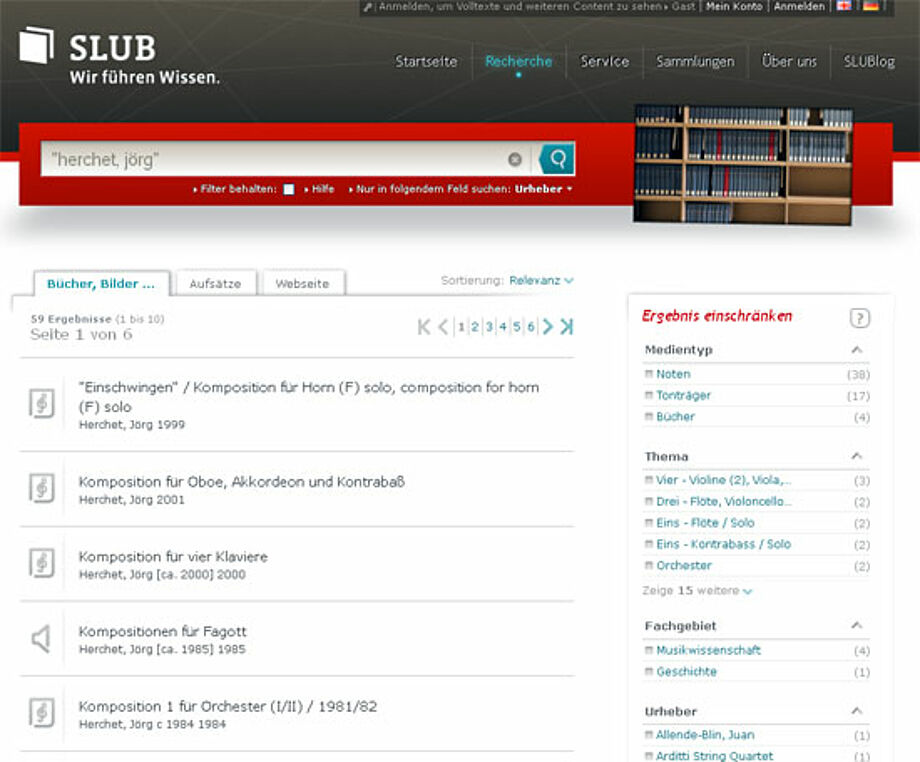
Schüler von Jörg Herchet (Auswahl)
Reiko Füting über seinen Lehrer Jörg Herchet: „Eines von vielen Dingen, die ich an meinem Lehrer und Freund Jörg Herchet bewundere, ist seine Gabe, große Bögen scheinbar mühelos und auf natürlich - zwingende Weise zu spannen. Dieses Denken in großen Dimensionen offenbart sich in seinem Werk, und es offenbart sich in seinem Leben. Die Konsequenz, die dieser Eigenschaft innewohnt, ist eine seltene Besonderheit.“
Thomas Bonhoff, Michael Flade, Reiko Füting, Jorge García del Valle Méndez, Eva-Margarita Geißler, Martin Hecker, Yong-Woo Jin, Dong-Hak Kim, Eun-Sun Lee, Alexander Morawitz, Johannes Motschmann, Torsten Reitz, Bernhard Schneyer, Karoline Schulz , Dr. Lydia Weißgerber, Alwyn Westbrooke u.a.
Successes abroad
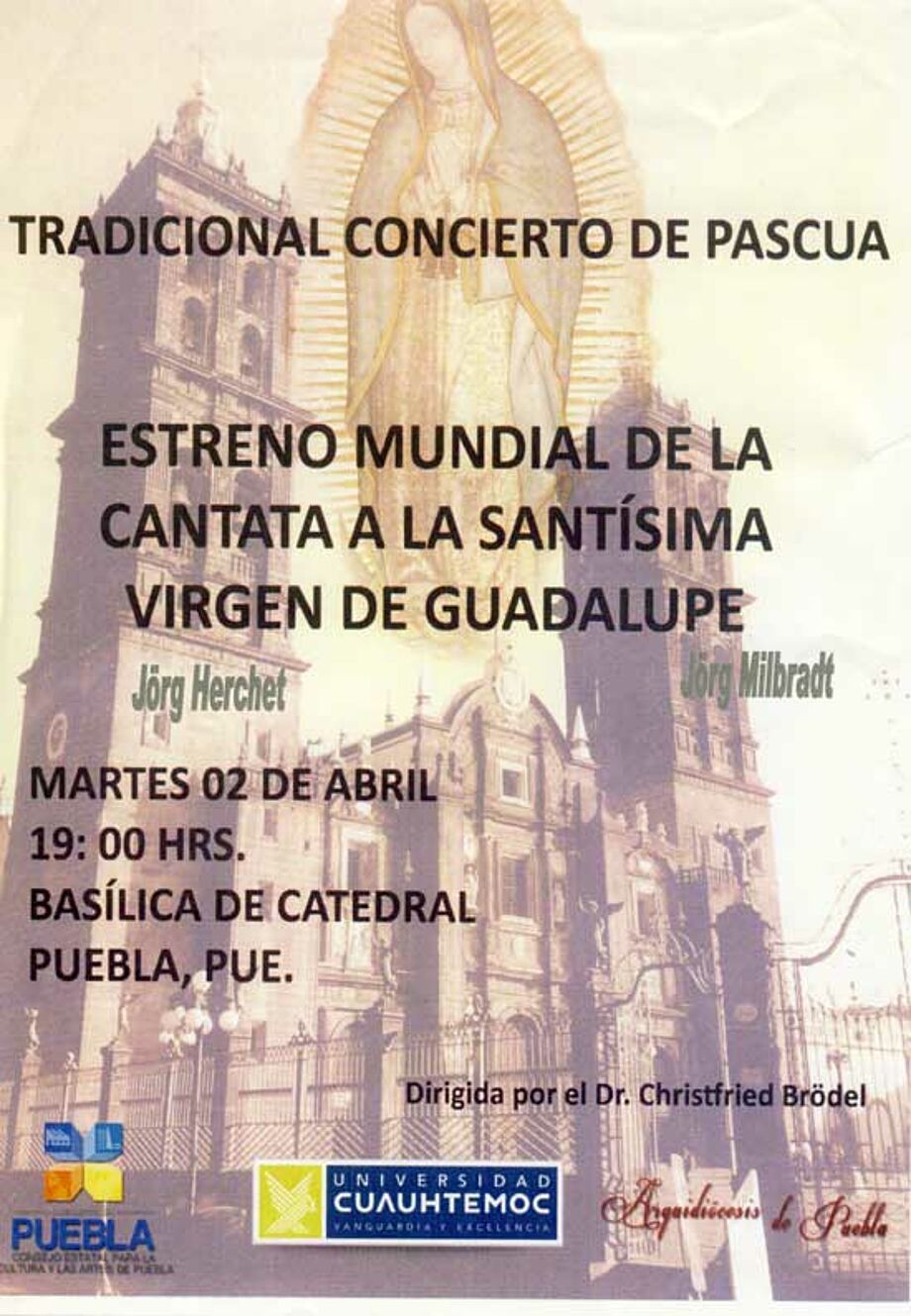
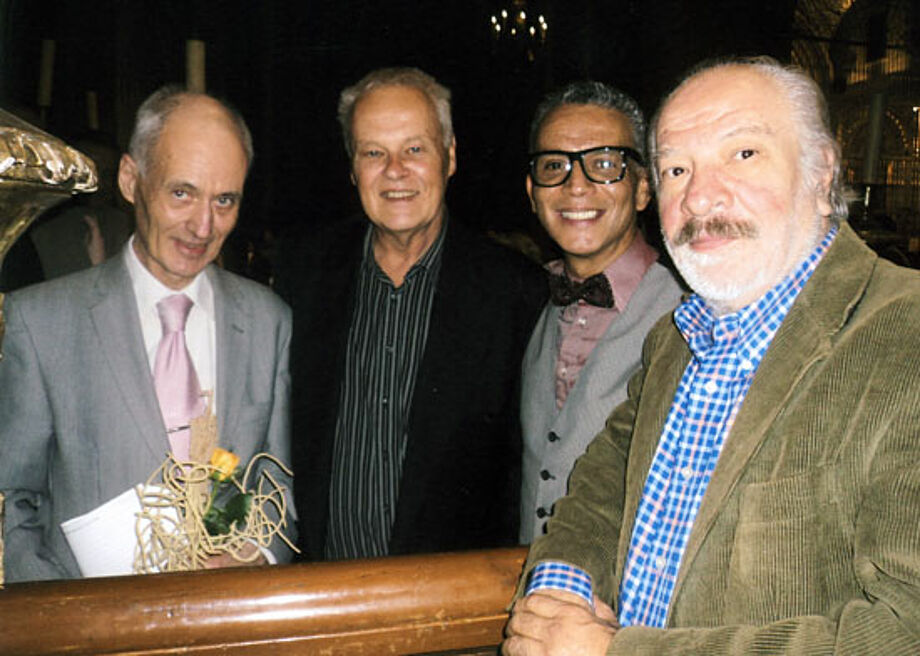
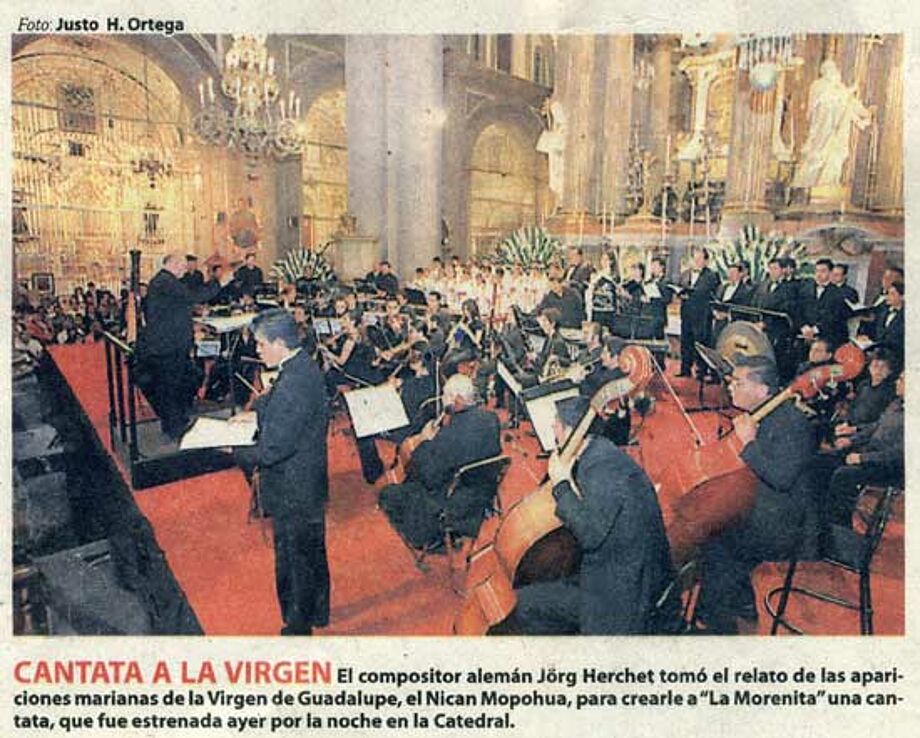
Several lectures in Mexico, Japan and the USA increased his international reputation. On 2 April 2013, the first performance of the "Cantata for the Feast of Our Lady of Guadalupe" took place in the Cathedral of Puebla (Mexico) with Dr Christfried Brödel as conductor. Composer and librettist were on site.
